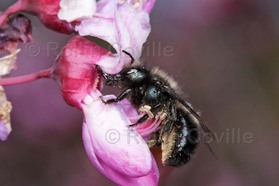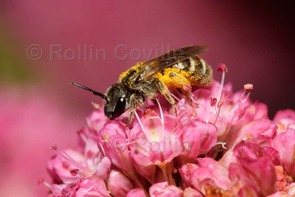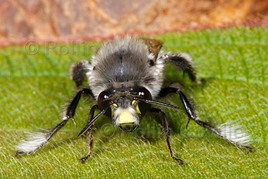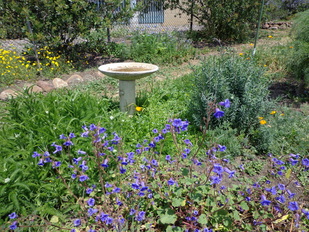Why bees?

Mason bee visiting red bud.
Try to imagine our modern world without apples, pears, citrus fruits, carrots, grapes, olives, tomatoes, and almonds. Then try to imagine our California wildlands devoid of beautiful Spring wild flowers. We know you can’t imagine the world without chocolate, so we won’t even ask. Most of our temperate vegetable, fruit, and nut crops, along with most of our wildland flowers, depend on the pollinating services of bees.
The world’s star pollinators, bees, play an important, but sometimes invisible, role in our everyday lives. And their services in wildlands are free!
The world’s star pollinators, bees, play an important, but sometimes invisible, role in our everyday lives. And their services in wildlands are free!
What do they need?

Sweat bee on red buckwheat.
Bees depend on pollen and nectar for their reproduction and survival. They are specially equipped to collect these resources. As they buzz from one flower to another, pollen gets caught in specialized hairs and other pollen-collecting body structures. Some of this pollen makes it back to the nest to feed bee babies (larvae), but some of it accidentally rubs off onto the reproductive parts of other flowers. If the flowers are of the same species, cross-pollination will likely occur. Nectar (or sugar water) fuels the bees' foraging flight, and also is added to nest cells to feed baby bees.
Are bees in trouble?

Male Anthophora pacifica.
Recent surveys (conducted in the early to mid 1990s) indicate that pollinators world-wide are declining. The cause for decline is habitat destruction brought about by human development. This was the subject of a recent book “Forgotten Pollinators” by Stephen Buchmann and Gary Paul Nabhan, and has been a focal area for new research aimed at how to conserve and protect existing pollinators, especially bees. One of the outcomes of the downward trend of pollinators has been to awaken the scientific community to the need for extending information to the public, and increasing general awareness of bees and other flower visitors to protect this valuable natural resource for the future.
Some of the factors contributing to pollinator declines worldwide include:
Some of the factors contributing to pollinator declines worldwide include:
- Habitat destruction and fragmentation
- Increased pesticide use
- Climate change
- Introduced species
- Disease and mites
How you can help?

- Plant a garden full of flowering plants to attract bees and other important pollinators.
- Don't use pesticides in your garden, they kill the good bugs too!
- Provide a space for nesting bees, with bee condos and bare patches of soil.
- Spread the word! Help educate your family, friends, and neighbors about the benefits of bees.
- Help fund our research by donating below.
